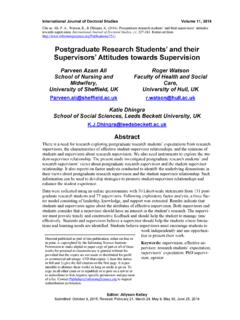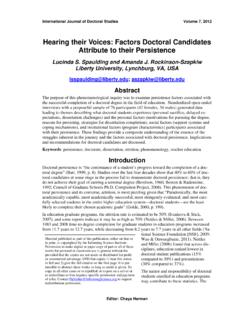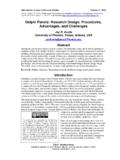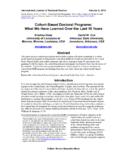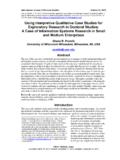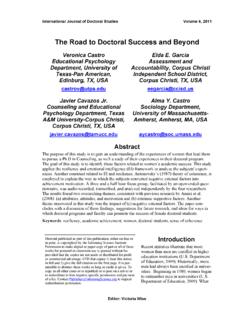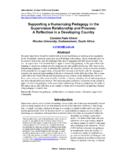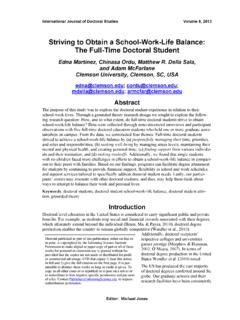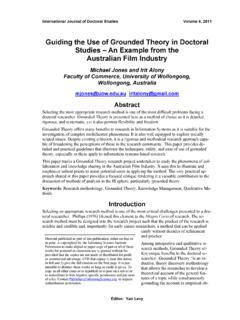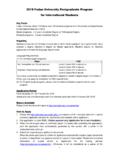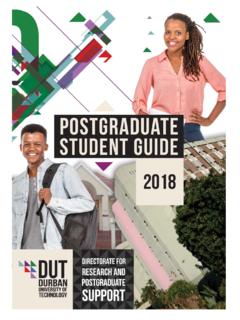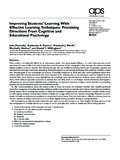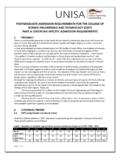Transcription of Improving Doctoral Success by Matching PhD …
1 International Journal of Doctoral Studies Volume 11, 2016 Cite as: Orellana, M. L., Darder, A., P rez, A., & Salinas, J. (2016). Improving Doctoral Success by Matching PhD students with supervisors. International Journal of Doctoral Studies, 11, 87-103. Retrieved from Editor: Eli Cohen Submitted: January 5, 2015; Revised: October 30, November 19, 2015; Accepted February 2, 2016 Improving Doctoral Success by Matching PhD students with Supervisors Martha L. Orellana Universidad Aut noma de Bucaramanga, Bucaramanga, Colombia Ant nia Darder, Adolfina P rez, and Jes s Salinas Universitat de les Illes Balears, Palma, Illes Balears, Spain Abstract A key aspect of the effective supervision of PhD research is the supervisor-student relationship. This interaction is affected by the characteristics and needs of students and institutional condi-tions, as well as the skills, attitudes, and roles of supervisors and their supervisory styles. When supervision is carried out at a distance, it entails an additional challenge, mainly concerning inter-action.
2 The purpose of this study is to improve the research process, supervision, and design of virtual environments in order to support this supervision. The study identifies the supervisory relationships that affect Doctoral research conducted at a distance from the student s academic institution. It also describes how students and their supervisors perceived the characteristics of supervision and the skills and attitudes students perceived in and expected from their supervisors. For data collection, semistructured interviews were used. The results indicate important differ-ences between supervisors perceptions concerning their own role and students needs regarding supervision, and they demonstrate the importance of attending to student needs and, on the part of supervisors, exercising responsibility in the development of research competencies in students , as is the case of independence of criteria and autonomy. Keywords: postgraduate research supervision, distance supervision, PhD supervision, superviso-ry styles, supervisor attitudes and roles, supervisor-student relationship Introduction Advances in technology are leading to new possibilities for the access and availability of PhD studies and, above all, to profound changes in the way relationships be-tween supervisors and students are es-tablished during postgraduate research, especially when these relationships are conducted at a distance.
3 One of the most sensitive aspects of the development and successful completion of distance postgraduate research is the support and guidance received from Material published as part of this publication, either on-line or in print, is copyrighted by the Informing Science Institute. Permission to make digital or paper copy of part or all of these works for personal or classroom use is granted without fee provided that the copies are not made or distributed for profit or commercial advantage AND that copies 1) bear this notice in full and 2) give the full citation on the first page. It is permissible to abstract these works so long as credit is given. To copy in all other cases or to republish or to post on a server or to redistribute to lists requires specific permission and payment of a fee. Contact to request redistribution permission. Matching PhD students with Supervisors 88 supervisors (Jones, 2013). As far as the supervisor s role is concerned, this guidance varies ac-cording to the supervisor s profile and the stage of the research as well as the student s profile and needs.
4 Hence, different supervisory roles and different models of supervision can be identi-fied. The present study addresses a particular dynamic of supervision in which supervisor and student use online communication systems instead of meeting face-to-face. Online postgraduate research works in a different way than face-to-face supervision because it presents greater difficulties and requires changes in supervisory roles. Several authors, including Price and Money (2002), Ma-cauley (2002), and Hartikainen, Suhonen, and Sutinen (2006), have pointed out these difficulties. This study focuses on Spanish Doctoral programs in education sciences in which Latin American students participate. Although several Doctoral -program formats exist in Spain, almost all the cases investigated here belong to the training phase, usually two years long, and the research phase, in which students develop the thesis. The students in these Doctoral programs are charac-terized by their internationalization, mature age, and part-time status, and because they are con-ducting the research stage at a distance they have not completely abandoned their obligations to their academic institution.
5 This type of distance PhD student usually relies heavily on systems and environments that enable communication management such as virtual learning environments and online communication tools such as e-mail and videoconferencing. Thus, the communication space itself conditions the specific elements of the supervisor-student relationship. This study analyzes the elements of supervisory style and, alongside this, the supervisor s skills, both of which are key in a distance context. Literature Review A key factor of the Success of a research project is the relationship between the supervisor and researcher during the training stage. This relationship is influenced by a variety of factors, among which are the characteristics of both supervisor and student (including interests, experiences, and prior knowledge at the onset of the research), supervisor roles, and supervisory styles. Effective supervision of researchers during the training stage is a multifactorial process that involves not only issues such as the relationship between students and supervisors at all levels, but also the infrastructure available, institutional and government policies, structures, and procedures (Abid-din, Ismail, & Ismail, 2011; Green, 2005; Holbrook et al.)
6 , 2014; Jiranek, 2010; Jones, 2013). Weaknesses of postgraduate Programs and Factors that Affect their Successful Completion Researchers have identified the following as significant predictors of completion of the postgrad-uate research project: degree of attendance (part- or full-time), availability of research funding, age, excellence of prior academic record, discipline (sciences or arts), gender, suitability of the research topic, intellectual environment of the department, and access to appropriate equipment and to computers (Bourke, Holbrook, Lovat, & Farley, 2004; Jones, 2013; Latona & Browne, 2001; Lee, 2008; Pearson & Brew, 2002; Rodwell & Neumann, 2007). Love (2001) identified the following as the main weaknesses of Doctoral programs based on tradi-tional models: A large number of students do not complete the program. The directors of research projects often do not know whether a researcher in training needs additional support for the completion of the program.
7 Orellana, Darder, P rez, & Salinas 89 The syllabi of many such postgraduate programs emphasize the acquisition of skills that may be of little use to their students . The teaching process associated with the acquisition of research competencies and knowledge is itself weak. In addition to the elements that affect the Success or completion of the program, these weaknesses must be taken into account in supervision practice. According to Edwards (2002), moreover, there exist four significant problems in the postgraduate experience: (1) clashes between the purposes of supervisors and students , (2) lack of support structures for students , (3) student isolation, and (4) student confusion regarding the function of resources. Along these lines, a frequently investigated issue is the quality of supervisory practices and its demonstrable effect on the completion of the PhD (Ali & Kohun, 2007; Cullen, Pearson, Sasha, & Spear, 1994; Dinham & Scott, 1999; Golde, 2005; Green, 2005; Lee, 2008; Lee & Boud, 2009; McCallin & Nayar, 2012; Vilkinas, 2007; Wikeley & Muschamp, 2004).
8 Concerning the quality of these practices, Dinham and Scott (1999, p. 2) underlined the importance of supervisor-student interaction and observed that the student-supervisor relationship has the potential to be marvel-ously enriching and productive, but may also be extremely difficult and personally devastating. The skills of the supervisor represent another factor that may influence the successful completion of research projects. Effective Supervisory Roles and Styles Many studies have identified the style, roles, and abilities of the supervisor as key factors of the Success of PhD candidates (Brown & Atkins, 1988; Buttery, Richter, & Filho, 2005; Cullen et al., 1994; Latona & Browne, 2001; Pearson & Brew, 2002; Quinn, 1988; Taylor & Beasley, 2005; Vilkinas, 2007; Vilkinas & Cartan, 2001, 2006). In this study, roles are defined as the functions and tasks involved in the supervisory process; supervision styles are defined as the approaches supervisors adopt for their interventions, which may vary during the supervisory process and in which different roles are combined with different degrees of intensity; and skills and competencies are defined as requirements for supervisors ideal performance of their diverse roles.
9 Brown and Atkins (1988), in a now-classic study, suggested that effective supervisors must be competent researchers, must be able to reflect this competence in research practices, and must be able to analyze the knowledge, techniques, and methods that make their supervision effective. Moreover, Abiddin, Ismail, and Ismail (2011), in their investigation of clinical supervision, men-tioned the following four skills that, according to Wilkin, Bowers, and Monk (1997), a supervisor requires: (1) communication skills, which include an ability both to listen and to make comments in an open, objective, and constructive way; (2) support-oriented skills, which involve an ability to identify at what moment a student needs help and to offer the appropriate support; (3) general skills; and (4) skills specific to the student s field of research. Another important factor is the type of leadership carried out by the supervisor. According to Frischer and Larsson (2000), there are three patterns of leadership: democratic, authoritarian, and laissez-faire.
10 Cullen et al. (1994) organized the indicators of the effective management of research projects into four main categories. 1) Effective supervisory style is reflected in the skill of direction and leadership; organiza-tion of regular meetings; making time to enable students to develop original ideas; flexi-bility in project choice; encouraging ideas and individuality; and to a lesser extent, pro- Matching PhD students with Supervisors 90 moting close interaction with other academics, attendance at conferences, and publishing before completion of the research project. 2) Effective supervisor competence with respect to the student s project is reflected in scien-tific competence, familiarity with the relevant academic literature, expertise in the area of the project, and awareness of science overseas. 3) Effective supervisor attitudinal characteristics are reflected in approachability and friend-liness, being supportive and positive, being open-minded and willing to recognize errors, being organized and stimulating, and transmitting enthusiasm.
